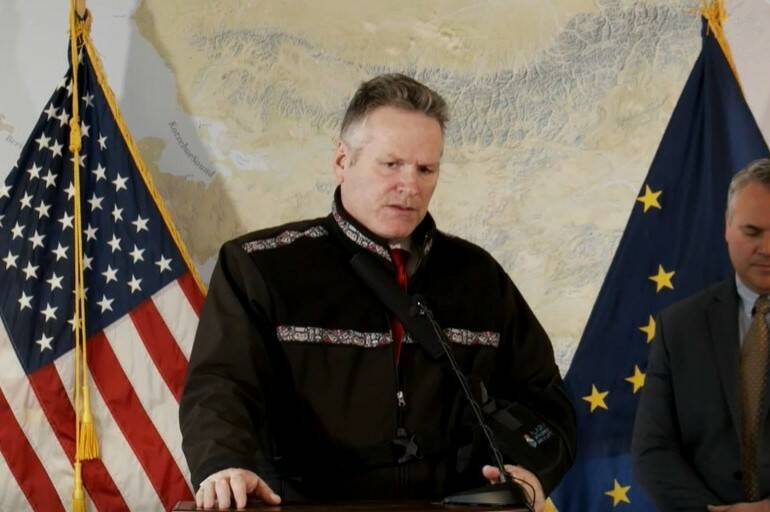Gov. Mike Dunleavy unveiled a sweeping set of proposals he said will help the state tackle its long-term issues of domestic violence, homelessness and missing and murdered Indigenous people. The governor called the package of programs and reforms the People First Initiative and said it would be aimed at tackling a range of issues related to public safety and prevention.
At a news conference Tuesday in Anchorage, surrounded by public health and safety officials, Dunleavy said the initiative would bring together public, private and tribal groups to consolidate information, increase staffing and provide better services to Alaskans in need.
Alaska leads the nation in rates of domestic abuse, according to the state’s own Council on Domestic Violence and Sexual Assault, which published a report in October which said 48% of women had experienced intimate partner violence and 41% have experienced sexual violence.
Dunleavy said Alaska’s statistics related to domestic violence are “baked into our own psyche, our own culture, it should never have been that way.”
According to a release from the governor’s office the initiative would make a substantial investment in the Department of Public Safety but also the Department of Health and Social Services which already manages services related to things like domestic abuse, foster care and homelessness. In past years, Dunleavy has proposed budget cuts for some programs pertaining to those areas. The state was already undergoing efforts to recruit and train more Alaska State Troopers and Village Public Safety Officers, the governor said.
[Group warns of costs, time and changes from constitutional convention]
Part of the initiative involved what Attorney General Treg Taylor called an “omnibus crime bill,” which he said will increase sentencing for certain crimes and better protect victims. The bill would also expand the definition of domestic violence, Taylor said, and make unwanted sexual contact a category of sex crime.
The initiative will require an initial investment, Dunleavy said, but said spending today would save money in the future by creating a better functioning system. One of the proposals in the program is to create a statewide database of information about at-risk individuals accessible by authorized entities statewide.
Upfront cost for the system will be $750,000, the governor’s office said, with an annual operating cost of $250,000. Dunleavy said at the press conference his budget proposal would be released Wednesday, but wouldn’t greatly increase the state’s spending. The governor also dismissed claims that the package was a “big government thing” and said several times at the conference public safety was an essential role of government.
According to a news release from the governor’s office, “this new system will allow for ease of use for authorized providers and grant administrators to spot patterns and identify root causes within homelessness, trafficking and MMIP. The authorized users will be able to monitor the efficacy of prevention and outreach efforts with the new database.” DHSS Commissioner Adam Crum said at the conference only authorized users under federal health privacy laws would have access to the information, and many of the databases already existed but were being consolidated under DHSS.
“The state can’t control everything, but the state should be responsible for the safety of its people,” Dunleavy said. “I don’t think people needing help is a big government thing. Maybe, just maybe, there’s something government can do for someone who really needs that help.”
In 2019, Dunleavy vetoed $3 million from the VPSO program, in addition to cuts to a number of other state services, made by then-Office of Management and Budget Director Donna Arduin. Critics of Arduin’s approach at the time said her cuts were unfocused, with Sen. Donny Olson, D-Golovin, saying at the time she used “a hatchet, not a scalpel.”
But the state was increasing its recruitment efforts for troopers and VPSO, according to Department of Public Safety Commissioner Jim Cockrell. The state was graduating new troopers, Cockrell said, and a $20,000 signing bonus had been popular in attracting working law enforcement officials from other states.
Dunleavy has defended his past cuts as an effort to rein in state spending following a drop in the price of oil in 2015, and this year the Alaska Permanent Fund has recorded record earnings. Dunleavy said his budget was aimed at creating a focused government and would actually be less than previous years.
Tuesday was also the second day of the annual Alaska Federation of Natives conference where Dunleavy has faced criticism —this year and in previous years —for his cuts to programs in rural Alaska. But the Dunleavy defended his record Tuesday, citing a decrease in crime across the state and the rate at which the state had been processing its backlog of sexual assault kits.
Dunleavy said the exact details of the initiative’s cost would be shown in the budget, but he believed the issues addressed were areas where Alaskans could find common ground.
“I’m hoping that this is one area where the governor’s office and the Legislature are going to be able to come together,” Dunleavy said.
• Contact reporter Peter Segall at psegall@juneauempire.com. Follow him on Twitter at @SegallJnuEmpire.

